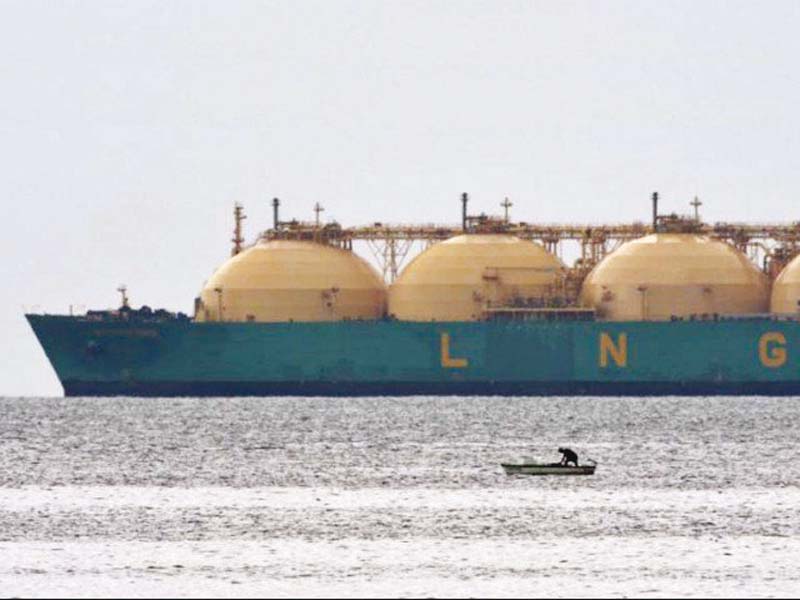
The cabinet has given the go-ahead to a package for Karachi’s export-oriented industries in a bid to provide liquefied natural gas (LNG) at a weighted average cost in winter.
This cost is lower than the price at which LNG is being provided to the export-oriented industries in Punjab.
Under the package, a weighted average tariff of Rs930 per million British thermal units (mmbtu) will be charged from industrial consumers in Karachi between October 2020 and February 2021. This rate is lower than the $6.5 per mmbtu (approximately Rs1,080) at which export goods manufacturers are receiving gas in Punjab.
From March 2021, the notified domestic tariff will be charged unless an alternative mechanism is devised and approved. Industrial consumers in Karachi, who were drawing more than the approved gas load, would regularise their connections before November 30, failing which any volume taken in excess of the approved load would be charged full LNG price without exception, or the volume would be curtailed to the approved gas load.
Sui Southern Gas Company (SSGC) will facilitate the consumers to ensure the regularisation of gas load within time.
These proposals had been approved by the Economic Coordination Committee (ECC) and the cabinet ratified them.
When gas supply from domestic sources started becoming insufficient and could not meet demand of industries, the ECC in its meeting on September 17, 2018 decided that gas supply to five major export-oriented, zero-rated industries - textile, leather, carpet, sports and surgical goods - in Punjab would be revised from a ratio of 28:72 to 50:50 for domestic gas and re-gasified LNG respectively. Weighted average gas tariff on such consumers would be $6.5 per mmbtu. Gas price for consumers of SSGC and those of Sui Northern Gas Pipelines Limited (SNGPL) in Khyber-Pakhtunkhwa would remain unchanged, it agreed.
Based on the above ECC decision, the export industries, connected to the SNGPL network in Punjab, were being supplied a blend of domestic gas and re-gasified LNG at the weighted average tariff of $6.5 per unit while the cost exceeding the tariff had been picked up by the government as subsidy since 2018-19. However, it was not applicable to the SSGC network.
Before the onset of winter, both SSGC and SNGPL provided the current and projected gas/ re-gasified LNG availability and demand situation along with possible mitigation measures to deal with shortage.
As of September, SSGC was facing a shortfall of 155 million cubic feet per day (mmcfd), which came despite diversion of 100 mmcfd of re-gasified LNG to K-Electric by SNGPL to mitigate power shortage.
In order to bridge the supply-demand gap, SSGC suggested curtailment measures, which covered industries, compressed natural gas (CNG) stations, power production (K-Electric) and even domestic consumers. Currently, the producers of export goods have significant orders and are running above capacity.
In order to avoid curtailment of gas supply to these industries, the Power Division told the ECC that it was essential that they were provided gas. However, without recovery of LNG cost, SSGC would only be adding to the circular debt.
LNG supply to industries would ease pressure on SSGC in meeting needs of domestic consumers since the utility would have additional domestically produced gas for them.
The Petroleum Division was of the view that SSGC’s shortfall could be largely mitigated during October and November 2020 and February 2021 with additional LNG supplies subject to cost recovery.
The prime minister was also apprised of the proposals in a meeting on September 22, 2020 where the matter of gas shortage came up for discussion.
Consultative meetings were held with the producers of export goods in Karachi for devising a gas supply strategy in order to avoid negative impact on them. Industries agreed to pay average tariff of Rs930 per unit from October 2020 to February 2021, recognising that varying level of LNG supply would be added to the domestic natural gas supply.
Published in The Express Tribune, October 20th, 2020.
Like Business on Facebook, follow @TribuneBiz on Twitter to stay informed and join in the conversation.

1731570357-0/elon-musk-(1)1731570357-0-405x300.webp)
-(1)1717678110-0/Kendrick-(1)-(1)1717678110-0-165x106.webp)















COMMENTS
Comments are moderated and generally will be posted if they are on-topic and not abusive.
For more information, please see our Comments FAQ